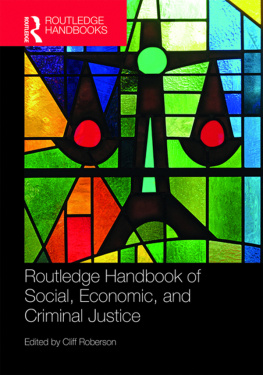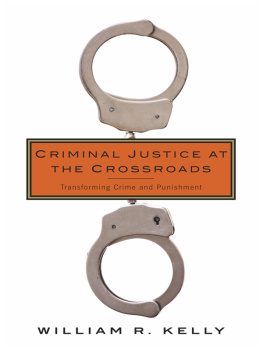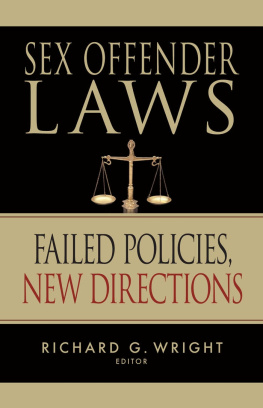First published by Willan Publishing 2004
This edition published by Routledge 2012
2 Park Square, Milton Park, Abingdon, Oxon OX14 4RN
711 Third Avenue, New York, NY 10017
Routledge is an imprint of the Taylor & Francis Group, an informa business
2004 Michael Tonry
All rights reserved; no part of this publication may be reproduced, stored in a retrieval system, or transmitted in any form or by any means, electronic, mechanical, photocopying, recording or otherwise without the prior written permission of the Publishers or a licence permitting copying in the UK issued by the Copyright Licensing Agency Ltd, 90 Tottenham Court Road, London W1P 9HE.
Hardback
ISBN 13: 978-1-84392-063-2
Paperback
ISBN 13: 978-1-84392-062-5
British Library Cataloguing-in-Publication Data
A catalogue record for this book is available from the British Library
Project management by Deer Park Productions,Tavistock, Devon
Typeset by GCS, Leighton Buzzard, Beds
Preface
Why is England the only major Western country whose government has chosen to emulate American crime-control policies and politics of the past quarter century?
It is puzzling.
During the 1970s and 1980s, England suffered from the same steeply rising crime rates that all Western countries did. And during the 1990s, England like other Western countries enjoyed sharply declining crime rates. Throughout the Western world, and in Eastern Europe, crime rates fell, whether imprisonment rates were high or low, rising or falling; whether police styles were traditional or innovative; whether nationwide crime-prevention initiatives were extensive or nonexistent. No matter what governments did or didnt do, crime rates fell.
Since the 1980s, many senior English practitioners, policy analysts and researchers have agreed, with their counterparts throughout Europe, that punishment practices and imprisonment patterns have little effect on crime rates and trends. Those are caused by broad-based social, economic and normative changes and the power of primary socializing institutions like families, schools and churches. In Labours tough on crime, tough on the causes of crime mantra, its the causes that matter.
And yet in 2004, England has implemented Europes only three-strikes-and-youre-out law and American-style mandatory minimum sentence laws. Earlier it experimented with boot camps and zero-tolerance policing. Englands government employs the most hyperbolic anti-crime rhetoric of any in Europe, language that elsewhere characterizes xenophobic right-wing fringe parties. Blair, Le Pen and Fortuyn are an odd and unexpected trio.
England has the highest imprisonment rate in Europe and the most rapidly rising prison population. And Parliament late in 2003 enacted a Criminal Justice Act full of symbolic tough-on-crime measures, some of which are sure more often to result in wrongful convictions of innocent people.
Since the 1980s, many senior English practitioners, policy analysts and researchers have celebrated, with their counterparts throughout Europe, the expansion of procedural protections of human rights in the criminal justice system. And yet the Criminal Justice Act 2003 is bedecked with provisions withdrawing and weakening procedural protections afforded people accused of crimes.
A possible reason why England alone is emulating the United States is that American policies have been marvellously successful, but somehow only English policy-makers have noticed. This isnt and cant be true.
Many of the most notorious American innovations, including some that England has embraced and others it has considered, have been conspicuously unsuccessful, and at devastating social and economic cost. Most informed people across the American political spectrum accept that three-strikes, mandatory minimum and truth-in-sentencing laws have had few if any crime-reduction effects. They have, however, produced unjustly severe punishments, ballooned the prison population, and, once enacted, proven remarkably hard to repeal.
Similarly, most informed observers now recognize that zero-tolerance policing had little to do with New York Citys crime-rate declines in the 1990s (most other large American cities enjoyed similar declines whatever their policing styles), but resulted in large increases in police violence, racial confrontation, and unnecessary imprisonment.
American policies have had enormous, widely acknowledged costs much the highest imprisonment rate among Western countries, the lengthiest prison sentences in the world, increasing numbers of executions, a third of its young black men under criminal justice system supervision, an iatrogenic War on Drugs and unhappy recognition in many states that prisons are receiving vast sums that would be better spent on education or health care.
All across the United States, judges, prosecutors, and legislators are changing direction. Mandatory minimum and three-strikes laws are much less often invoked. States are repealing tough laws, releasing people from prison earlier and creating new drug treatment and other policies meant to divert people from prison.
I am confident that most senior civil servants in the Home Office agree with much of what Ive said in the preceding paragraphs its a fair summary of the policy and research literatures, and of recent American developments and have themselves said similar things to ministers. Ministers have refused to listen.
The current Labour government has knowingly adopted policies known to be ineffective or unlikely to work because of an arguable belief that its own continuation in office justifies the unnecessary human suffering and waste of public resources that its policies produce.
Policy-makers adopt bad policies for four kinds of reasons evidence, ignorance, ideology and self-interest. Sometimes they believe, wrongly but honestly, that existing evidence gives valid reasons to believe that policies will have wanted effects. Sometimes they act ignorantly, simply not knowing that what seems a good idea isnt. Sometimes they are so influenced by ideology or political self-interest that they adopt policies primarily for symbolic reasons, without knowing or caring whether they will work.
The last is what happened in England. Deliberate decisions to emulate harsh American crime-control policies in general, and Bill Clintons political approach to crime (Dont let your opponents look tougher than you do) in particular, are among the results. So are sky-rocketing prison populations, worsening racial disparities, demoralized officials and avoidable suffering by offenders, their loved ones and their communities.
To an American, resident now in England for five years, who long admired the rationality, decency and moderation of Englands criminal justice system, especially in comparison with the United States, all that I have described is perplexing. Until the early 1990s only America developed an hyperbolic law-and-order politics and cruel, simplistic policies that were based more on ideology and politicians perceived self-interest than on evidence or acceptance of human frailty. And then in the early 1990s, England broke ranks with other Western countries and began to emulate American politics and policies.
Why, I wondered, and with what effects?
In this book, I attempt to disentangle the influences of evidence, ignorance, ideology and self-interest in New Labours crime policies and its recent proposals for changes to the criminal justice system. In the first half, I examine central proposals in the recent White Paper







